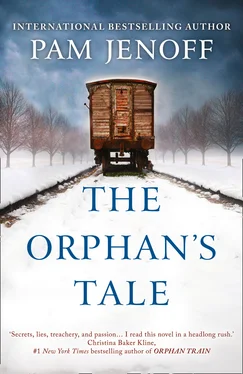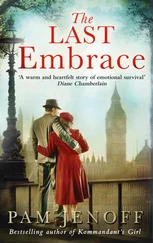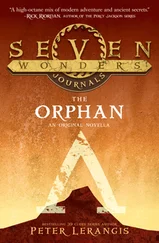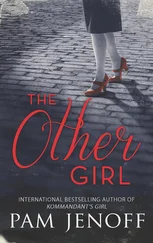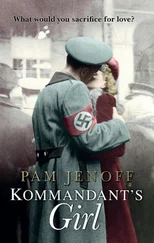“What is it?” I demanded. I was not supposed to see the child. But I struggled against pain to sit upright. “What’s wrong?”
“Everything is fine,” the doctor assured. “The child is healthy.” His voice was perturbed, though, face stormy through thick glasses above the draped cream sheet. I leaned forward and a set of piercing coal eyes met mine.
Those eyes that were not Aryan.
I understood then the doctor’s distress. The child looked nothing like the perfect race. Some hidden gene, on my side or the German’s, had given him dark eyes and olive skin. He would not be accepted into the Lebensborn program.
My baby cried out, shrill and high-pitched, as though he had heard his fate and was protesting. I had reached for him through the pain. “I want to hold him.”
The doctor and the nurse, who had been recording details about the child on some sort of form, exchanged uneasy looks. “We don’t, that is, the Lebensborn program does not allow that.”
I struggled to sit up. “Then I’ll take him and leave.” It had been a bluff; I had nowhere to go. I had signed papers giving up my rights when I arrived in exchange for letting me stay, there were hospital guards... I could barely even walk. “Please let me have him for a second.”
“Nein.” The nurse shook her head emphatically, slipping from the room as I continued to plead.
Once she was out of sight, something in my voice forced the doctor to relent. “Just for a moment,” he said, reluctantly handing me the child. I stared at the red face, inhaled the delicious scent of his head that was pointed from so many hours of struggling to be born and I focused on his eyes. Those beautiful eyes. How could something so perfect not be their ideal?
He was mine, though. A wave of love crested and broke over me. I had not wanted this child, but in that moment, all the regret washed away, replaced by longing. Panic and relief swept me under. They would not want him now. I’d have to take him home because there was no other choice. I would keep him, find a way...
Then the nurse returned and ripped him from my arms.
“No, wait,” I protested. As I struggled to reach for my baby, something sharp pierced my arm. My head swam. Hands pressed me back on the bed. I faded, still seeing those dark eyes.
I awoke alone in that cold, sterile delivery room, without my child, or a husband or mother or even a nurse, an empty vessel that no one wanted anymore. They said afterward that he went to a good home. I had no way of knowing if they were telling the truth.
I swallow against the dryness of my throat, forcing the memory away. Then I step from the station into the biting cold air, relieved that the Schutzpolizei des Reiches, the leering state police who patrol the station, are nowhere to be seen. Most likely they are fighting the cold in their truck with a flask. I scan the train, trying to pinpoint the buzzing sound. It comes from the last boxcar, adjacent to the caboose—not from the engine. No, the noise comes from something inside the train. Something alive.
I stop. I have made it a point to never go near the trains, to look away when they pass by—because they are carrying Jews.
I was still living at home in our village the first time I had seen the sorry roundup of men, women and children in the market square. I had run to my father, crying. He was a patriot and stood up for everything else—why not this? “It’s awful,” he conceded through his graying beard, stained yellow from pipe smoke. He had wiped my tear-stained cheeks and given me some vague explanation about how there were ways to handle things. But those ways had not stopped my classmate Steffi Klein from being marched to the train station with her younger brother and parents in the same dress she’d worn to my birthday a month earlier.
The sound continues to grow, almost a keening now, like a wounded animal in the brush. I scan the empty platform and peer around the edge of the station. Can the police hear the noise, too? I stand uncertainly at the platform’s edge, peering down the barren railway tracks that separate me from the boxcar. I should just walk away. Keep your eyes down, that has been the lesson of the years of war. No good ever came from noticing the business of others. If I am caught nosing into parts of the station where I do not belong, I will be let go from my job, left without a place to live, or perhaps even arrested. But I have never been any good at not looking. Too curious, my mother said when I was little. I have always needed to know. I step forward, unable to ignore the sound that, as I draw closer now, sounds like cries.
Or the tiny foot that is visible through the open door of the railcar.
I pull back the door. “Oh!” My voice echoes dangerously through the darkness, inviting detection. There are babies, tiny bodies too many to count, lying on the hay-covered floor of the railcar, packed close and atop one another. Most do not move and I can’t tell whether they are dead or sleeping. From amid the stillness, piteous cries mix with gasps and moans like the bleating of lambs.
I grasp the side of the railcar, struggling to breathe over the wall of urine and feces and vomit that assaults me. Since coming here, I have dulled myself to the images, like a bad dream or a film that couldn’t possibly be real. This is different, though. So many infants, all alone, ripped from the arms of their mothers. My lower stomach begins to burn.
I stand helplessly in front of the boxcar, frozen in shock. Where had these babies come from? They must have just arrived, for surely they could not last long in the icy temperatures.
I have seen the trains going east for months, people where the cattle and sacks of grain should have been. Despite the awfulness of the transport, I had told myself they were going somewhere like a camp or a village, just being kept in one place. The notion was fuzzy in my mind, but I imagined somewhere maybe with cabins or tents like the seaside campsite south of our village in Holland for those who couldn’t afford a real holiday or preferred something more rustic. Resettlement. In these dead and dying babies, though, I see the wholeness of the lie.
I glance over my shoulder. The trains of people are always guarded. But here there is no one—because there is simply no chance of the infants getting away.
Closest to me lies a baby with gray skin, its lips blue. I try to brush the thin layer of frost from its eyelashes but the child is already stiff and gone. I yank my hand back, scanning the others. Most of the infants are naked or just wrapped in a blanket or cloth, stripped of anything that would have protected them from the harsh cold. But in the center of the car, two perfect pale pink booties stick stiffly up in the air, attached to a baby who is otherwise naked. Someone had cared enough to knit those, stitch by stitch. A sob escapes through my lips.
A head peeks out among the others. Straw and feces cover its heart-shaped face. The child does not look pained or distressed, but wears a puzzled expression, as if to say “Now what am I doing here?” There is something familiar about it: coal-dark eyes, piercing through me, just as they had the day I had given birth. My heart swells.
The baby’s face crumples suddenly and it squalls. My hands shoot out, and I strain to reach it over the others before anyone else hears. My grasp falls short of the infant, who wails louder. I try to climb into the car, but the children are packed so tightly, I can’t manage for fear of stepping on one. Desperately, I strain my arms once more, just reaching. I pick up the crying child, needing to silence it. Its skin is icy as I pluck it from the car, naked save for a soiled cloth diaper.
The baby in my arms now, only the second I’d ever held, seems to calm in the crook of my elbow. Could this possibly be my child, brought back to me by fate or chance? The child’s eyes close and its head bows forward. Whether it is sleeping or dying, I cannot say. Clutching it, I start away from the train. Then I turn back: if any of those other children are still alive, I am their only chance. I should take more.
Читать дальше
